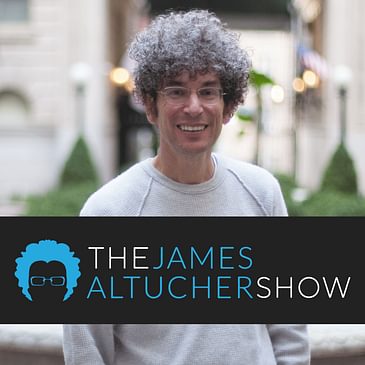Ever wondered just how vast our universe truly is or if there's any truth to those compelling space conspiracies? In this episode of the James Altucher Show, James sits down with Brian Keating, a renowned astrophysicist, to delve deep into the cosmos. They chat about the groundbreaking findings from the James Webb Space Telescope, providing an intriguing glimpse into the universe's origins. But it's not all about distant galaxies; James throws in some of the most captivating space-related conspiracies he's come across, and with Brian's expertise, they sift fact from fiction. Plus, tune in to hear about the recent developments in the world of superconductors and the possibility of a room-temperature stable variant.
From the enigma of extra-terrestrial life to the truth about the universe's beginning, this episode promises to be a blend of scientific insight and casual banter. Whether you're a science enthusiast or just someone who loves a good conspiracy theory, there's something in it for you!
- https://BrianKeating.com/list
- https://twitter.com/DrBrianKeating
- Brian's Books and Brian's Blog,
- Listen to the Into The Impossible podcast,
- Check out Brian's YouTube channel, with a following of 140k followers and growing.
------------
What do YOU think of the show? Head to JamesAltucherShow.com/listeners and fill out a short survey that will help us better tailor the podcast to our audience!
Are you interested in getting direct answers from James about your question on a podcast? Go to JamesAltucherShow.com/AskAltucher and send in your questions to be answered on the air!
------------
Visit Notepd.com to read our idea lists & sign up to create your own!
My new book Skip the Line is out! Make sure you get a copy wherever books are sold!
Join the You Should Run for President 2.0 Facebook Group, where we discuss why you should run for President.
I write about all my podcasts! Check out the full post and learn what I learned at jamesaltucher.com/podcast.
------------
Thank you so much for listening! If you like this episode, please rate, review, and subscribe to “The James Altucher Show” wherever you get your podcasts:
Follow me on Social Media:
------------
- What do YOU think of the show? Head to JamesAltucherShow.com/listeners and fill out a short survey that will help us better tailor the podcast to our audience!
- Are you interested in getting direct answers from James about your question on a podcast? Go to JamesAltucherShow.com/AskAltucher and send in your questions to be answered on the air!
------------
- Visit Notepd.com to read our idea lists & sign up to create your own!
- My new book, Skip the Line, is out! Make sure you get a copy wherever books are sold!
- Join the You Should Run for President 2.0 Facebook Group, where we discuss why you should run for President.
- I write about all my podcasts! Check out the full post and learn what I learned at jamesaltuchershow.com
------------
Thank you so much for listening! If you like this episode, please rate, review, and subscribe to “The James Altucher Show” wherever you get your podcasts:
Follow me on social media:




